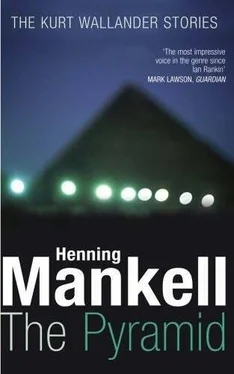'How did it go in Malmö?' he asked.
'Unfortunately, the rumours aren't true,' Wallander answered.
'Unfortunately?'
'It would have given us a motive. Gambling debts, hired guns. Everything we need.'
'Svedberg managed to find out through the business register that the company Markresor no longer exists. They merged with another company five years ago. And that company went under last year. He thought it would be impossible to get any old lists of passengers. But he thought it might be possible to trace the bus driver. If he's still alive.'
'Where is he?'
'I don't know.'
'Where are Hansson and Svedberg?'
'Svedberg is rooting around in Lamberg's finances. Hansson is talking to the neighbours. Nyberg is scolding a technician who misplaced a footprint.'
'Is it really possible to misplace a footprint?'
'It's possible to lose a hymn book in a garden.'
Martinsson is right, Wallander thought. Anything can be lost.
'Have we received any information from the public?' he asked.
'Nothing, apart from the Simovic family and the hymn book. As well as a few things that can be written off immediately. But there could be more. People normally take their time.'
'And Backman the bank director?'
'Reliable. But he hasn't seen more than we already know.'
'And the cleaning lady? Hilda Waldén?'
'Nothing more there either.'
Wallander leaned against the door frame.
'Who the hell killed him? What kind of a motive could there have been?'
'Who changes a radio station?' Martinsson said. 'And who runs around town at night with a hymn book in his pocket?'
The questions remained unanswered for the moment. Wallander went to his office. He felt restless and anxious. The meeting with Peter Linder had ruled out finding an answer to the murder in the illegal gambling world. What was left? Wallander sat down at his desk and tried to write out a new overview of the case. It took him over an hour. He read through what he had written. More and more he was leaning towards the possibility that the man had been let into the shop. It was most likely someone Lamberg knew and trusted. Someone who his widow in all likelihood did not know. He was interrupted in his thoughts by Svedberg knocking on the door.
'Guess where I've been,' he said.
Wallander shook his head. He was not in the mood for guessing.
'Matilda Lamberg is cared for at a facility right outside Rydsgård,' he said. 'Since it was so close I thought I might as well go out there.'
'So you've met Matilda?'
Svedberg immediately became sombre.
'It was terrible,' he said. 'She is incapable of doing anything.'
'You don't have to tell me more,' Wallander said. 'I think I get the picture.'
'Something strange happened,' Svedberg continued. 'I spoke to the director. A kind-hearted woman who is one of these quiet heroes of the world. I asked her how often Simon Lamberg came to visit.'
'What did she say?'
'He had never been there. Not once in all these years.'
Wallander said nothing, feeling disturbed.
'Elisabeth Lamberg comes once a week, usually on a Saturday. But that wasn't what was strange.'
'Then what was it?'
'The director said that there's another woman who comes to visit. On an irregular basis, but she does turn up on occasion. No one knows her name, no one knows who she is.'
Wallander frowned.
An unknown woman.
Suddenly he had a strong feeling. He didn't know where it had come from, but he was convinced. They had finally turned up a clue.
'Good,' he said. 'Very good. Try to round people up for a meeting.'
Wallander had the investigative team assembled at half past eleven. They came in from all over and everyone appeared brimming with the new energy that the fine weather had brought. Just before the meeting, Wallander had received a preliminary report from the medical examiner. It could be presumed that Simon Lamberg had died sometime before midnight. The blow to the back of his head had been delivered with tremendous force and had killed him immediately. In the wound they had recovered tiny slivers of metal that were easily recognisable as brass veneer, so it was now possible to make some assumptions about the murder weapon. A brass statuette or some such thing. Wallander had immediately called Hilda Waldén and asked if there had been any brass objects in the studio. She said no, which was the answer Wallander had wanted. The man who had come to kill Simon Lamberg had brought the murder weapon. This in turn meant that the murder had been planned. It was not something that had arisen from a heated argument or some other sudden impulse.
This was received as an important statement by the investigative squad. They now knew they were looking for a perpetrator who had acted with deliberation. They did not, however, know why he had returned to the scene of the crime. He had most likely left something behind. But Wallander could not let go of the feeling that there may have been another reason, one that they had not yet discovered.
'What would that be?' Hansson asked. 'If he hadn't forgotten something? Did he come there to plant something?'
'Which in turn may indicate a degree of forgetfulness,' Martinsson said.
They proceeded through the facts slowly and methodically. Most of the case was still very unclear. They were waiting for many answers or had not yet managed to put the information they did have in order. But Wallander wanted everything on the table even now. He knew from experience that detectives on an investigative squad needed to get access to information at the same time. One of his own worst policing sins was that he often kept information to himself. As the years went by he had managed to get a little better in this regard.
'We have a fair number of fingers and shoes,' Nyberg said when Wallander as usual turned to him first. 'We also have a good thumb on the hymn book. I don't know yet if it matches any of the prints we recovered in the studio.'
'Is there anything to say about the hymn book?' Wallander asked.
'It gives the impression of frequent use. But there is no name in it. Nor is there a stamp of any kind to indicate that it belongs to a particular parish or church.'
Wallander nodded and looked at Hansson.
'We aren't quite done with the neighbours yet,' he began. 'But no one that we've talked to has reported hearing or seeing anything unusual. No nightly tumult inside the studio. Nothing out on the street. No one could remember seeing anyone behaving in an unusual manner outside the studio either that night or on any earlier occasion. Everyone has assured us that Simon Lamberg was a pleasant person, although reserved.'
'Have any calls come in?'
'Calls are constantly coming in. But there's nothing of any im mediate interest.'
Wallander asked about the letters that Lamberg had written in which he complained about police performance.
'They're archived in some central location in Stockholm and are being retrieved. There was only one that marginally touched on our district.'
'I have trouble evaluating that album,' Wallander said. 'If it's of any significance or not. It may of course be because I'm included in it. At first I found it disturbing. Now I just don't know any more.'
'Other people sit at the kitchen table and write scathing missives to various political leaders,' Martinsson said. 'Simon Lamberg was a photographer. He didn't write. Symbolically, the darkroom was his kitchen table.'
'You may be right. Hopefully, we'll come back to this when we know more.'
'Lamberg was a complicated person,' Svedberg said. 'Pleasant and reserved. But also something else. We just can't articulate what this something else might be.'
'No, not yet,' Wallander said. 'But a picture of him will eventually take shape. It always does.'
Читать дальше












